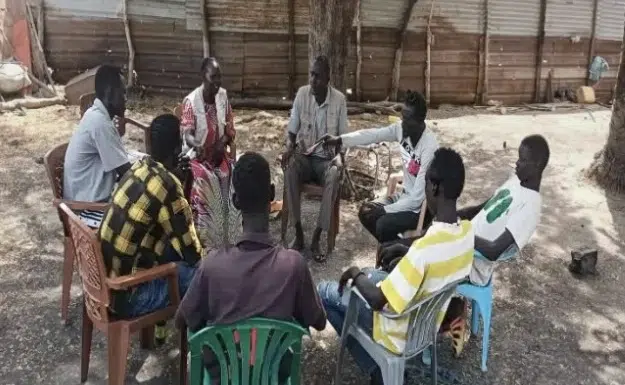How a Community Came Together to End Gang Violence in Rubkona County
For over a year, two rival youth gangs in Unity State – from two different IDP (internally displaced persons) sites were locked in a cycle of violence. What started as disputes over young women, territorial tensions, and the destruction of property escalated into retaliatory attacks. The violence took a heavy toll, leading to injuries among community members—including four young boys and three young girls. Gender-based violence (GBV), including harassment and sexual violence, further fueled the tensions, making daily life in the community increasingly unsafe.
But a new approach helped break the cycle. Through patience, trust-building, and nonviolent intervention, Nonviolent Peaceforce (NP) helped these young people find a path toward peace.
A Community in Crisis
Over the course of a year, residents of the Delmet IDP area—where many of the youth involved in the violence lived—lived in fear. Night robberies surged, mostly driven by the two rival gangs, and selective policing—where some officers turned a blind eye due to personal ties—only fueled community frustration. With tensions reaching a breaking point, NP stepped in to facilitate dialogue.
Instead of focusing only on the visible violence, NP convened a community protection meeting in Delmet to explore the deeper issues behind the conflict. Residents raised concerns about security gaps, lack of justice, and the fear that any peace efforts would be short-lived. It became clear that while addressing the gangs was crucial, the underlying systemic problems also needed to be tackled.
Engaging the Gangs
Direct engagement with the gangs was critical, but fraught with challenges. Many youth were wary, suspecting NP of collaborating with police to have them arrested. Trust had to be built before any real conversation could begin.
NP met with a Rubkona police commissioner, explaining the mediation process. After NP detailed its peace initiative, the police agreed not to interfere and to support the peace process.
Finding Common Ground
With trust slowly taking root, NP met with the first gang from the Chilak IDP site. They admitted that disputes over young women and local drugs were major triggers of violence. They were open to reconciliation, but only if their rivals stopped instigating conflict.
A day later, NP met with the second gang from the Delmet IDP area. They viewed territorial encroachment as the primary source of conflict.
NP posed a question to both groups: Would they be willing to meet face-to-face, with community leaders present, to seek a resolution? Both agreed.
The Peace Agreement
For the first time, the two gangs sat across from each other outside of a violent confrontation. In a neutral space near Bentiu town, they aired their grievances with community leaders present to mediate. After hours of discussion, key agreements emerged:
• Cease attacks on each other
• Refrain from making unwanted advances toward each other’s girlfriends
• Allow police intervention if either group violates the resolutions
• Collaborate to promote peace and understanding within their territories
• Publicly apologize to community members for past disruptions
To reinforce their commitments, NP provided conflict resolution training, equipping the youth with tools to de-escalate future disputes nonviolently.
A Lasting Impact
In a final joint meeting with the gangs, community leaders, and police officers, the resolutions were formally presented, and local authorities encouraged ongoing peace efforts. A work plan was established for the youth to engage in peacebuilding activities and awareness campaigns.
In the months since then, no further violent incidents have been reported between the gangs. NP continues to monitor the situation, ensuring that the young men remain engaged in peacebuilding efforts. By addressing the deeper causes of violence and fostering dialogue, the community has taken a crucial step toward lasting peace.
This success underscores the power of locally-led solutions. When communities are empowered with the tools to resolve conflicts nonviolently, sustainable change becomes possible. NP remains committed to supporting South Sudan youth in building a future free from cycles of violence.

